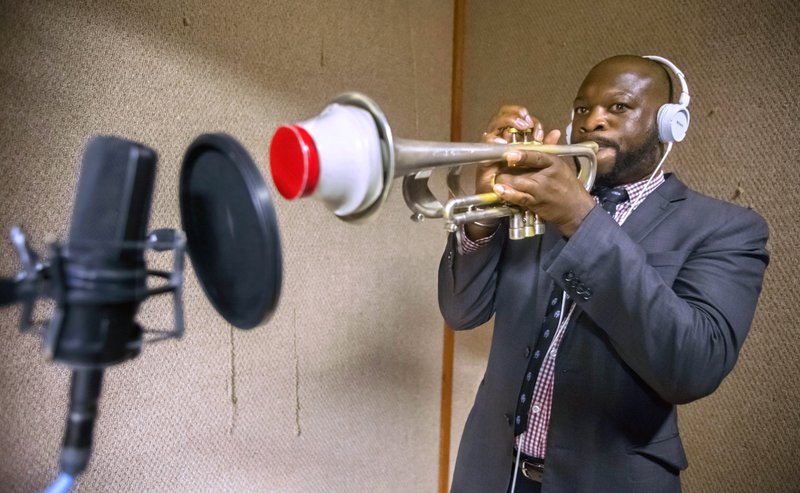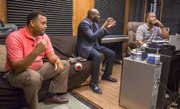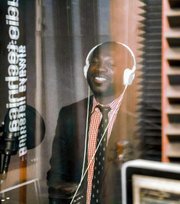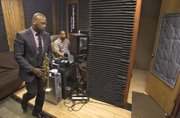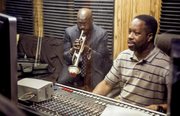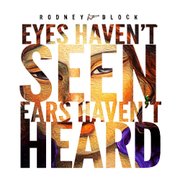Miles did it. That's who.
Miles Davis, the epitome of jazz cool, both in personality and music -- that's the reason Rodney Block plays the trumpet.
Miles was the coolest; he played the trumpet and the wizardry he practiced was jazz, and Block wanted to emulate that at some level.
Back in sixth grade, back in Block's hometown of Dumas, Block picked up the trumpet, playing a horn inherited from his older brother, who decided he didn't like being in band.
That's all it took.
Now it's some 35 years later. The 46-year-old Block is cool (dig the black socks, spotted with multicolored boomboxes), he plays the trumpet and jazz is his sorcery of choice.
Here, on this late-July day, Block, dressed in a dark suit over a maroon-and-white checkered shirt, is coaxing notes from his trumpet inside a compact recording booth at Genetics Studio in downtown Little Rock.
He's got an EP to finish, titled Eyes Haven't Seen/Ears Haven't Heard (with cover art by New Mexico artist Miguel Martinez), which comes out Thursday and Block is luring notes out of his trumpet for an unnamed song.
It's effortless but studied, the way that Block approaches the trumpet, an instrument that is unforgiving. He controls it, or seems to, with each breath, giving it life, purpose. But Block also knows the trumpet is an ornery brass, searching for any opportunity to shout off false notes.
On this particular track, Block's playing is hurried, but not careless. He breathes in. Breathes out. And repeats, enticing notes from his trumpet with each blow.
Block knows what notes he needs from his trumpet. Sometimes these notes jab, charge the eardrums and pierce the quietness like an arrow.
Elsewhere, on more doleful tunes, Block needs notes that just float out, barely riding invisible waves, lingering beyond grasp like a wisp of smoke.
The hardest notes have to be seduced from the trumpet.
Block says there's a "feeling" he gets when he has nailed a passage of music, when he has given the music his "perspective in the best possible way."
"I want to give [the music] a good perspective," he says. "One hundred people play the same tune, but the one that stands out is the one that gives it a different perspective."
Finished, Block walks out of the booth and sits on a couch behind Eugene Whitmore, looking over the latter's shoulder. Whitmore is the owner of Genetics Studio, which outside, with its front on Seventh Street, is featureless other than the awning, where white letters once boldly proclaiming On Time Audiovisual have deteriorated to near nothingness.
The inside of the studio is likewise bare-bones. A President Barack Obama puzzle is framed and mounted on the wall nearest the front door. One room is decorated with framed LPs from the likes of Nat "King" Cole, Charley Pride, Chic, Barry Manilow, Willie Nelson, ZZ Top, Donna Summer and others.
The actual recording studio is in the back of the space. It's a square room: a couch, some chairs, a boxy recording booth with a window facing Whitmore, and a desk topped with the mixer, multitrack recorder and a computer.
Block's music plays from the speakers. These notes glide. Block taps his foot. But he stares at the computer screen, watching his art move as a solitary digital line after being converted by music production software.
Block and Whitmore first played together years ago, back in the Arkansas Delta, with Whitmore, a few years older, raised in Humphrey, playing the bass while Block played the trumpet. Their musical educations were similar, growing up in the church and discovering jazz and other musical greats through listening closely.
That, Block will say now, is where he first started learning the trumpet, an instrument that takes a certain kind of person to play. Sometimes brutish, sometimes gentle, but always willing, yearning, searching for that perfect musical note.
He was drawn to music because of the variations in the artistic endeavor. The perspectives its different genres offer. Also, Block says, there's a spiritual component that music brings to everyone's life.
"It connects us all no matter the barrier; it's the most perfect language," he says.
...
Born in Dumas, Block has been a professional trumpet player for more than 15 years. He graduated from the University of Arkansas at Monticello in 1994, with a bachelor's in speech communication, and moved to Kansas City, Mo., soon after.
Block would stay there for about 10 years, working but also immersing himself in the city's rich jazz culture, exposing himself to new sounds and learning to subdue the trumpet. He started playing venues around the city, and other genres of music started leaking into his straight-ahead jazz trumpeting. A touch of gospel here, perhaps some hip-hop, funk and R&B. A little soul.
Those sounds remain with Block. Sure, what he mostly plays is smooth jazz -- but with flourishes of hip-hop and other genres. Some tunes, such as "Roger and the Cool Kids" on the forthcoming EP, are more banging, party anthem hip-hop, with electro funk keyboards inspired by Zapp or the Dazz Band, rhyming by Thememusiq (one of the songwriters on the album) and just a slight touch of jazz.
This blending of musical genres, while still remaining true to jazz, is natural to Block, a fan of several musical genres. Gospel was Block's first love. Then came Davis -- and the trumpet -- and then hip-hop. And he's a big fan of composers, such as the late Ouachita Baptist University professor and wind symphony maestro Francis McBeth.
But jazz and hip-hop -- that's a musical niche that Block likes. He mentions loving Miles Davis and John Coltrane tag-teaming "Stella by Starlight," recorded in May 1958. Miles plays the beginning melody, and then "Coltrane comes in with this pretty soaring tenor solo," Block says.
"But then I love listening to Common," he says. "Early Kanye [West]. Musically, he's a great artist. He was a beat maker before he got on the scene. I love the soul singers. Some of these artists who are coming up and they are beat makers but they also sing. Anderson Paak. He's a real dope artist. There's so much music and I appreciate it all."
Moving to Little Rock about 10 years ago to be closer to family in Dumas, Block quickly formed the backing band The Real Music Lovers and soon the group was making the rounds, playing at churches, weddings and wedding receptions, clubs, private birthday parties and other venues.
In June 2009, Block released his first album, Outside the Box. He has followed it with a collection of albums and EPs, including 2014's The Last Action Heroes -- a hip-hop powered mix tape with Thememusiq.
"If I'm doing a project, he's going to be on there," Block says of Thememusiq. "I just think the chemistry works for us. His personality really comes through on the tracks and he's a lot of fun to work with."
Block's most recent release was 2015's Hey You!, also recorded by Whitmore at Genetics Studio. The EP was released right before last year's Labor Day weekend.
Hey You! sold out its initial run of 1,000 hard copies (and many more digital copies), says Patrick Pettus, Block's band manager, and the "Labor Day weekend has been a good weekend for us." Why not release Eyes Haven't Seen/Ears Haven't Heard before the same weekend?
Plus, Block and band -- now christened the Collective and featuring Eugene Whitmore's son Ky Whitmore on keyboards, Jonathan Burks on drums and Joel "Jammin J.C." Crutcher on bass -- stay busy during the late summer and early fall. That's when they can play more outside, with local singer Bijoux joining them. (She typically makes a guest appearance on recordings, too.)
This year, there's a Wednesday night party at the Hot Springs Jazz Fest followed by a Sept. 9 appearance at Jazz Eureka in Eureka Springs. The Rodney Block Collective closes out September with a Sept. 28 show at Jazz in the Park in Little Rock's Riverfront Park.
...
The recording of Eyes Haven't Seen/Ears Haven't Heard, with its five tracks and two interludes, first started in the middle of spring, when it was originally titled Undefined.
Block says the Eyes Haven't Seen/Ears Haven't Heard title "appeals to my spiritual upbringing (the title is a passage from the Bible) and to the notion of creativity in regards to art and music."
"Creativity is always happening, always evolving, there is always a new perspective," he says.
In mid-July, Block and Eugene Whitmore were still meddling with that creativity, readying the songs of Eyes Haven't Seen/Ears Haven't Heard.
One, "My '90s Crush," is so named because Block says it takes him back to "my college years, the 1990s. It feels like a nice vibe, a summer vibe." Another, "In This Moment ... I Think of You," features tenor saxophonist Merlon Devine, a Little Rock native, floating his horn above a rhythm of soft brushed drums and piano chords.
Eugene Whitmore is co-producer of the EP, along with Block, but other local producers and songwriters, people such as Thememusiq, Jamaal Lee, Ky Whitmore and Haywood King, either assist with songwriting or producing.
Ky Whitmore says his writing process for Block is simple. A melody arrives -- from who knows where -- and the younger Whitmore builds a beat around it, mostly a drum pattern but really whatever sound is necessary. Instruments are added, subtracted, and then the beat is presented to Block.
"I want to write something that people could be uplifted by," Ky Whitmore says. "That's the feel of the project. That's the feel of Rodney's music, whether it's hip-hop or jazz. There's a heartwarming feel to it."
Block listens to the beats created for him and does his part. The song slowly builds, bar by bar, before it's time for Genetics Studio, where Block has recorded his last four records. The recording process is piecemeal (all have day jobs, Block as a medical infusion salesman for a specialty pharmacy). An hour is spent here, three hours there, a block of time late at night after a weekend gig. Bits of tracks are passed around via Dropbox.
As a song nears completion, Block and Eugene Whitmore fine-tune it in the tiny recording space at Genetics Studio -- really nothing more than a back room in a former office suite where Whitmore pastored his church, Network of Believers, which he has since moved to south Little Rock.
The pair work closely, shaping songs with slight adjustments. Pettus says the trumpeter "trusts Eugene."
Block nods.
"Eugene's going to hear stuff and he's going to correct stuff that a regular person may not hear," Block says. "That's important. If I'm going to be out there like that, I want people to hear me."
Sometimes all it takes is a few words between them to nudge a song along.
"I like that one, but I don't like that to start with," Block says of a bar of music. Both men silently bob their heads while listening.
In the corner of the room, a Roland JX-8P synthesizer rests against a wall, which, like the rest of the walls, is lined with gray foam padding. A Rhodes SeventyThree electric piano leans against another wall.
"Take me back. I'm just gonna blow freestyle over the first bridge," Block says.
"I'm starting from the bridge. First bridge," Whitmore replies.
The recording process is split seconds of inspiration, searching for perfection, and the grind of repeating, repeating and repeating, buffing a song until it shines.
Whitmore admits he doesn't ever think a song is completely done. Such is the nature of recording. But at some point, he says, they just have to "give the best presentation."
"It's just the way it is," he says. "Being a musician and playing music my whole life, you just have to put it out because you'll always hear another thing or want to do this or that."
Block pops into the recording booth again. Once again he tempts notes from his trumpet as Whitmore watches the music as a digitized line. Block blows, the music slices through the small studio. Whitmore taps his foot.
Then it's over, and Block opens the booth door.
"Yeah, I think we got everything we need for that," he says.
Time for the next song.
Style on 08/28/2016
